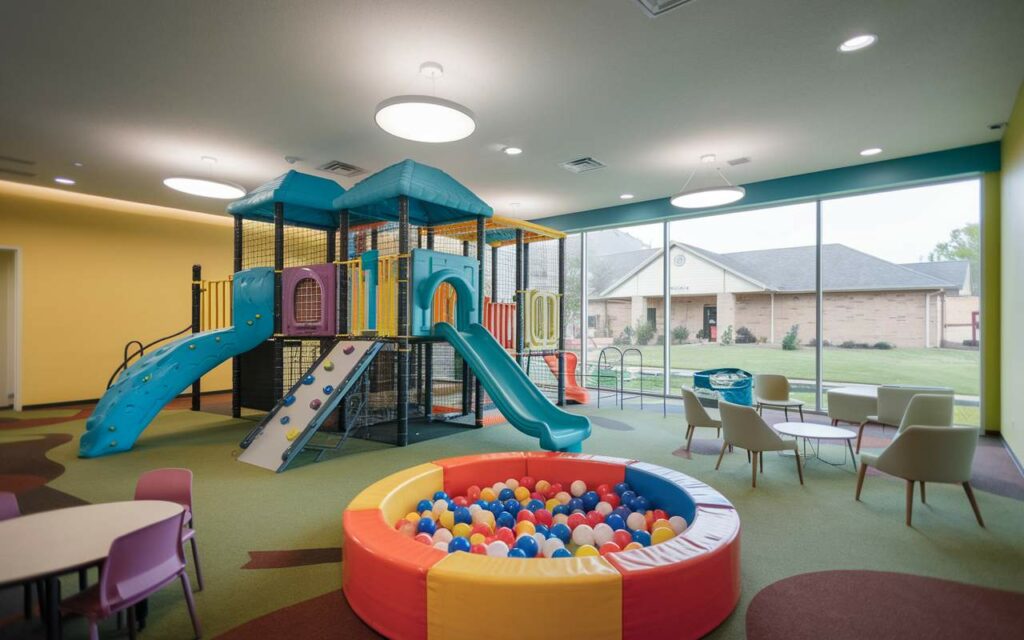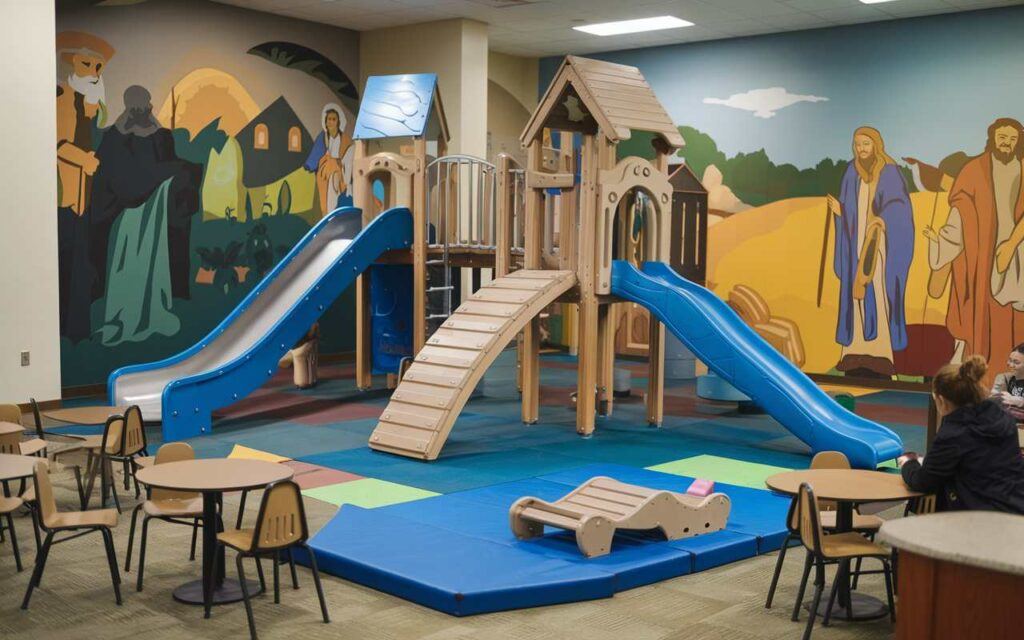Thinking about starting a trampoline park? Awesome! It’s an exciting business venture that brings joy and fitness to people of all ages. But before you dive in, you’ve got to get a handle on one big question: how much does a trampoline park cost? It’s not just about trampolines and foam pits. There are a ton of expenses to consider, from initial setup to ongoing operational costs. Let’s jump into the nitty-gritty and figure out what you need to budget for. Ready? Let’s bounce into it!

What Affects the Cost of a Trampoline Park?
Several factors impact your budget when you’re planning to build a trampoline park. Let’s break down the main components that affect the trampoline park cost to build.
Standort

Location is a huge factor in determining the overall cost of your trampoline park. Urban areas with high foot traffic often come with higher real estate costs, but they also offer greater revenue potential. Zum Beispiel, leasing a 10,000 sq. ft. space in a prime urban location can cost anywhere from $10,000 Zu $50,000 pro Monat, depending on the city. Suburban or rural areas might offer lower lease costs, potentially around $5,000 Zu $15,000 per month for a similar-sized space, but they may attract fewer customers. Also, consider local regulations and zoning laws, which can add to your initial costs through permits and compliance fees.
Size and Scale
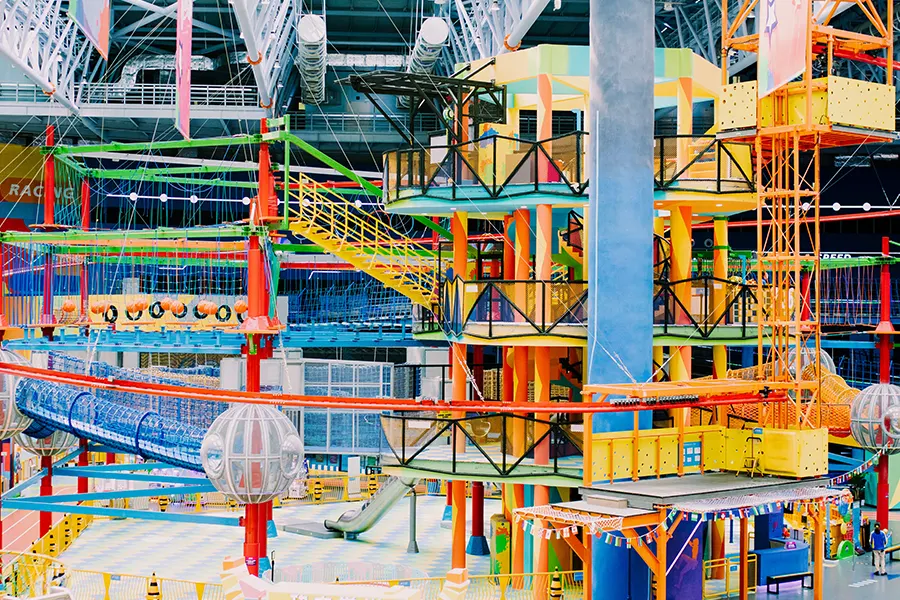
The size and scale of your trampoline park directly affect your investment. A small park (around 10,000 sq. ft.) might cost between $500,000 Zu $1 million to set up. Medium-sized parks (10,000 Zu 20,000 sq. ft.) can range from $1 million to $2 Million. Large parks (20,000+ sq. ft.) can exceed $2 Million, especially if they include multiple attractions and high-end amenities. The bigger the park, the more equipment, staff, and maintenance you’ll need, driving up both initial and ongoing costs.
Equipment and Amenities
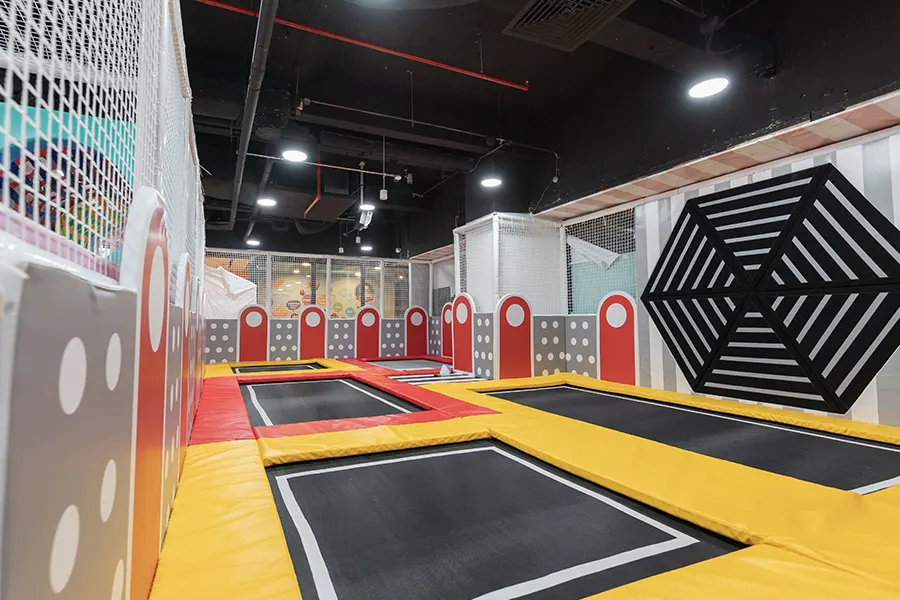
The trampoline park equipment cost can vary widely based on the type and quality of the equipment. Basic trampoline setups for a small park might cost around $100,000 Zu $200,000. Adding amenities like foam pits, dodgeball courts, Kletterwände, and ninja courses can increase costs significantly. Zum Beispiel, high-quality, safety-compliant equipment for a medium-sized park can easily cost between $200,000 Zu $500,000. You can invest in durable and premium equipment from certified trampoline manufacturers like Beslepark to ensure safety and reduce long-term maintenance expenses.
Construction and Setup
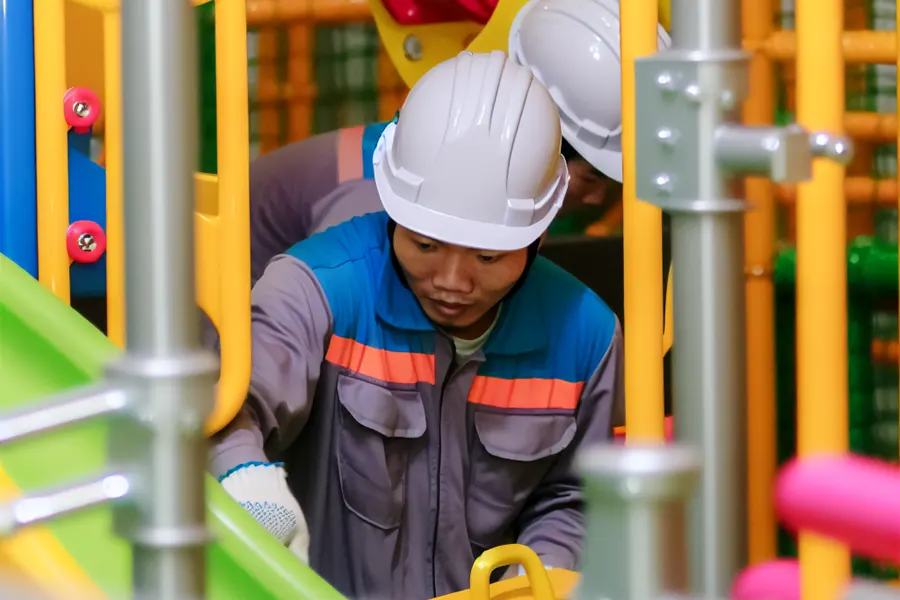
Trampoline park construction cost includes everything from building modifications to installing safety features. On average, construction costs can range from $50 Zu $150 per square foot. This means a 15,000 sq. ft. park might cost between $750,000 Zu $2.25 million to build. This cost includes flooring, safety padding, lighting, and other necessary installations. Hiring contractors experienced in building trampoline parks ensures the facility meets all safety standards and local regulations, which can help avoid costly mistakes and rework.
Insurance and Legal Requirements

Insurance and legal requirements are mandatory and can be quite expensive. Trampoline park insurance cost typically includes general liability, property insurance, and worker’s compensation. Annual insurance premiums can range from $20,000 Zu $60,000, depending on the park’s size, location, and the extent of coverage. Zusätzlich, legal costs for obtaining necessary permits and ensuring compliance with safety regulations can add another $10,000 Zu $30,000 to your initial expenses. These costs are crucial for protecting your business from potential lawsuits and ensuring a safe environment for your customers.
What Should Cost When Starting a Trampoline Park?
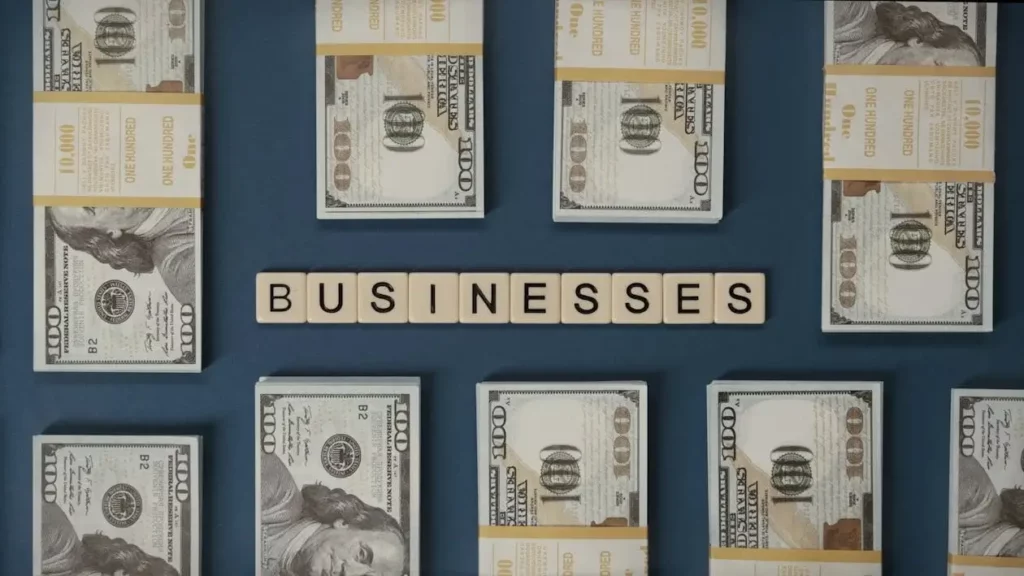
Starting a trampoline park involves various costs, which can be categorized into initial setup costs and ongoing operational costs. Here’s a detailed breakdown:
Initial Setup Costs
- Location and Lease:
- Lease deposits
- Monthly rent (depending on the size and location of the facility)
- Property taxes
- Construction and Renovation:
- Building modifications and renovations
- Flooring and safety padding
- Heating, ventilation, and air conditioning (HVAC) systems
- Electrical and plumbing work
- Trampoline Equipment:
- Trampolines and jumping surfaces
- Safety nets and enclosures
- Foam pits and padding
- Specialized attractions (e.g., dodgeball courts, ninja courses)
- Permits and Licenses:
- Business licenses
- Zoning permits
- Health and safety inspections
- Fire department permits
- Insurance:
- General liability insurance
- Property insurance
- Workers’ compensation insurance
Ongoing Operational Costs
- Utilities:
- Electricity
- Water
- Heating/cooling
- Staff Salaries and Benefits:
- Wages for full-time and part-time staff
- Benefits (health insurance, retirement plans)
- Payroll taxes
- Maintenance and Repairs:
- Routine maintenance of equipment
- Replacement of worn-out trampolines and padding
- General facility upkeep
- Marketing and Advertising:
- Ongoing social media campaigns
- Seasonal promotions and events
- Community engagement and sponsorships
- Insurance Premiums:
- Regular payments for insurance coverage
- Miscellaneous:
- Memberships to industry associations
- Legal and accounting services
- Software subscriptions
How Much Does It Cost to Start a Trampoline Park? Detailed Breakdown of Costs

Understanding the specific expenses involved is crucial when planning to start a trampoline park. Let’s dive into a detailed breakdown of trampoline park making cost, covering the various components that make up the total investment.
Startup Costs
The total cost to build a trampoline park can vary significantly depending on factors like location, size, and the range of attractions offered. Generally, you can expect to invest between $1 million to $3 Million. This comprehensive cost includes everything from leasing the facility to purchasing equipment and obtaining necessary permits. Proper planning and budgeting for these expenses will help ensure your trampoline park gets off to a successful start.
Initial Franchise Fees and Royalties
If you decide to go with a trampoline franchise, you’ll need to pay initial franchise fees and ongoing royalties. Franchise fees typically range from $30,000 Zu $75,000, providing you with the brand name, operational guidelines, and support. Zusätzlich, royalties are usually a percentage of your revenue, commonly between 6% Und 10%. While these costs add to your initial investment, they also offer the advantage of a proven business model and established brand recognition.
Facility Leasing or Construction Expenses
One of the biggest expenses in your startup costs will be leasing or constructing the facility. Leasing costs for a suitable space can range from $10,000 Zu $50,000 pro Monat, depending on the location and size. If you choose to construct a new building, construction costs can be around $50 Zu $150 per square foot. Zum Beispiel, a 15,000 sq. ft. facility could cost between $750,000 Und $2.25 Million. This expense covers everything from initial modifications to meet safety standards to ongoing maintenance and repairs.
Equipment Procurement and Installation
The trampoline installation cost includes purchasing and installing trampolines, safety features, and other attractions. For a medium-sized park, setup and installation can cost between $200,000 Und $500,000. This covers everything from the initial purchase of trampolines and foam pits to the installation of climbing walls, dodgeball courts, and other amenities. Ensuring that the installation meets safety and industry standards is crucial, so hiring experienced professionals is recommended to avoid costly errors and delays.
Licensing and Permits
Obtaining the necessary licenses and permits is essential for legal operation. This includes business licenses, health and safety permits, and any other regulatory approvals required by local authorities. Licensing and permit costs can range from $10,000 Zu $30,000, depending on your location and the specific requirements of your municipality. Ensuring that you comply with all legal requirements helps avoid fines and interruptions to your business.
Equipment and Maintenance Expenses
The initial cost of trampoline park equipment can be substantial, but it’s an investment in the safety and enjoyment of your customers. For a basic setup, equipment costs can range from $100,000 Zu $200,000. This includes trampolines, foam pits, and other essential elements. Maintenance expenses are ongoing and crucial for ensuring the longevity and safety of your equipment. Regular inspections, repairs, and replacements can cost anywhere from $10,000 Zu $30,000 jährlich, depending on the size of your park and the volume of use. Budgeting for these costs helps avoid disruptions and keeps your park in top shape.
Insurance Premiums and Liability Coverage
Insurance is a critical expense for trampoline parks, given the potential risks involved. Trampoline park insurance cost typically includes general liability insurance, property insurance, and worker’s compensation. Annual premiums can range from $20,000 Zu $60,000, depending on factors like the park’s size, location, and coverage limits. Liability coverage is particularly important to protect against accidents and potential lawsuits. Ensuring you have adequate insurance coverage is essential for safeguarding your business and providing peace of mind.
Additional Overhead and Operational Costs
Beyond the initial setup, there are several ongoing costs associated with running a trampoline park. These additional overhead and operational costs, also known as trampoline park investment costs, include staffing, utilities, marketing, and other day-to-day expenses. Staffing costs can vary based on the size of your park and the number of employees needed, ranging from $200,000 Zu $500,000 jährlich. Utilities, including electricity and water, can add another $50,000 Zu $100,000 per year. Marketing efforts to attract and retain customers will typically require a budget of $20,000 Zu $50,000 jährlich. Keeping a close eye on these expenses and managing them efficiently is key to maintaining profitability and ensuring the long-term success of your trampoline park.
Operational Expenses
Running a trampoline park involves various ongoing operational expenses that need careful management. Let’s explore the key areas where you’ll incur costs to keep your business running smoothly.
Staffing and Payroll
Staffing is one of the largest operational expenses for a trampoline park. You’ll need to hire a range of employees, including managers, front desk staff, maintenance workers, and safety monitors. The cost for staffing can vary widely based on your location and the size of your park. On average, expect to spend between $200,000 Zu $500,000 annually on payroll. This includes wages, benefits, and any training programs to ensure staff are properly equipped to provide a safe and enjoyable experience for your customers.
Utilities and Maintenance
Utilities and maintenance are essential for the day-to-day operations of your trampoline park. Utility costs, including electricity, water, heating, and cooling, can range from $50,000 Zu $100,000 per year, depending on the size of your facility and local utility rates. Regular maintenance of your equipment and facility is crucial to ensure safety and longevity. This includes routine inspections, repairs, and replacements, which can cost around $10,000 Zu $30,000 jährlich. Keeping your equipment in top condition not only ensures safety but also enhances the overall customer experience.
Marketing and Advertising
Marketing and advertising are vital to attract new customers and retain existing ones. An effective marketing strategy can include digital advertising, social media campaigns, local promotions, and partnerships with schools and community organizations. The annual budget for marketing and advertising typically ranges from $20,000 Zu $50,000. Investing in marketing helps build brand awareness and drives foot traffic to your park, which is essential for sustained growth and profitability.
Contingency Funds for Unforeseen Expenses
No matter how well you plan, unforeseen expenses can arise, making it crucial to have contingency funds set aside. This could cover unexpected repairs, emergency maintenance, or any other sudden financial needs. A good rule of thumb is to allocate about 5% Zu 10% of your annual budget as a contingency fund. For a trampoline park, this might mean setting aside an additional $50,000 Zu $100,000. Having these funds readily available ensures that you can handle unexpected costs without disrupting your operations or financial stability.
Cost Considerations for Different Trampoline Park Sizes

When planning to open a trampoline park, the size of the facility plays a crucial role in determining your overall costs. Let’s explore the cost considerations for different sizes of trampoline parks, from small-scale to large-scale operations.
Small-scale Parks (e.g., 5,000 – 10,000 sq. ft.)
Small-scale trampoline parks are typically more affordable to set up and operate compared to larger facilities. Here are some cost considerations:
- Commercial Indoor Playground Equipment Cost: For a smaller park, expect to spend between $100,000 Zu $200,000 on equipment. This includes basic trampolines, foam pits, and possibly a few additional attractions like dodgeball courts or climbing walls.
- Facility Leasing: Leasing a smaller space can range from $5,000 Zu $15,000 pro Monat, depending on the location and local real estate market.
- Staffing and Operational Costs: Annual operational expenses, including staffing and utilities, can range from $200,000 Zu $400,000.
Small-scale parks are ideal for targeting local communities and offering a more intimate, manageable experience for customers.
Medium-sized Parks (e.g., 10,000 – 20,000 sq. ft.)
Medium-sized trampoline parks offer more space and attractions, catering to a larger customer base. Here’s what you can expect in terms of costs:
- Commercial Indoor Playground Equipment Cost: Setting up a medium-sized park may cost between $200,000 Zu $500,000 for equipment. This includes a wider variety of attractions such as ninja courses, larger foam pits, and additional trampoline areas.
- Facility Construction or Leasing: Construction costs for a new facility can range from $1 million to $2 Million, or leasing costs can be between $10,000 Zu $30,000 pro Monat.
- Operational Costs: Annual operational expenses for a medium-sized park can range from $500,000 Zu $1 Million, covering staffing, utilities, maintenance, and marketing.
Medium-sized parks strike a balance between affordability and offering a broader range of attractions to attract a diverse customer base.
Large-scale Parks (e.g., 20,000+ sq. ft.)
Large-scale trampoline parks are expansive entertainment hubs that require substantial investment but offer extensive attractions and revenue potential. Here are the cost considerations:
- How Much Does a Big Trampoline Cost: Large trampolines and premium equipment for a big park can cost upwards of $500,000 Zu $1 million or more, depending on the scale and quality of the equipment.
- Facility Construction: Building a large-scale park can cost over $2 Million, considering the size and customization of the facility.
- Annual Operational Costs: Operating a large park can incur annual expenses exceeding $1 Million, covering staffing, utilities, maintenance, insurance, and marketing efforts.
Large-scale parks are suitable for major urban areas or destination locations, offering a wide range of attractions to draw in a substantial customer base.
Tips for Cost Management and Budgeting

Managing costs effectively is crucial when starting and operating a trampoline park. Here are some practical tips to help you budget wisely and maximize your resources.
Conduct Thorough Market Research and Feasibility Studies
Before launching a trampoline park, conducting comprehensive market research and feasibility studies is crucial. This process involves analyzing market demand, understanding consumer preferences, and assessing the competitive landscape. By gathering and analyzing data on demographics, spending patterns, and local economic trends, you can make informed decisions about location, pricing strategies, and the overall feasibility of your business concept. Thorough research not only minimizes risks but also maximizes opportunities for attracting and retaining customers in a competitive market.
Negotiate Favorable Lease Agreements and Vendor Contracts
Securing favorable lease agreements and vendor contracts is essential for managing startup and operational costs effectively. Negotiating competitive lease terms, including rent rates, lease duration, and tenant improvements, ensures financial flexibility and operational stability. Similarly, when engaging with vendors for equipment and services, negotiating favorable terms and pricing helps optimize budget allocation without compromising quality or safety standards. By leveraging negotiation strategies and understanding market dynamics, you can establish sustainable partnerships that support your trampoline park’s long-term success.
Implement Efficient Operational Practices
Implementing efficient operational practices is fundamental to controlling expenses and enhancing productivity in a trampoline park setting. This includes optimizing staffing levels based on customer demand, implementing energy-saving measures to reduce utility costs, and establishing proactive maintenance schedules to prolong equipment lifespan. Efficient operations not only streamline workflow but also contribute to a safe and enjoyable customer experience. By prioritizing efficiency and continuous improvement, trampoline park operators can achieve operational excellence while maintaining financial sustainability.
Seek Financing Options and Incentives
Diverse financing options and incentives are critical for securing the necessary capital to start and expand a trampoline park business. This involves researching and applying for small business loans, seeking investor partnerships, and exploring potential government grants or incentives for recreational facilities. By diversifying funding sources and capitalizing on available financial incentives, trampoline park entrepreneurs can mitigate financial risks and capitalize on growth opportunities. Strategic financing decisions enable business owners to navigate economic challenges and achieve long-term profitability in the competitive leisure industry.
Abschluss
Also, there you have it. Starting a trampoline park is a big leap, but knowing how much a trampoline park costs can help you land on your feet. It’s all about planning and managing your expenses, from the location and size to equipment and insurance. Think of it like assembling a giant puzzle; with each piece in place, you’re set for success. Whether you’re aiming for a small neighborhood spot or a massive entertainment hub, understanding the costs upfront will keep you bouncing in the right direction. Ready to make the jump? Let’s get that park off the ground!

